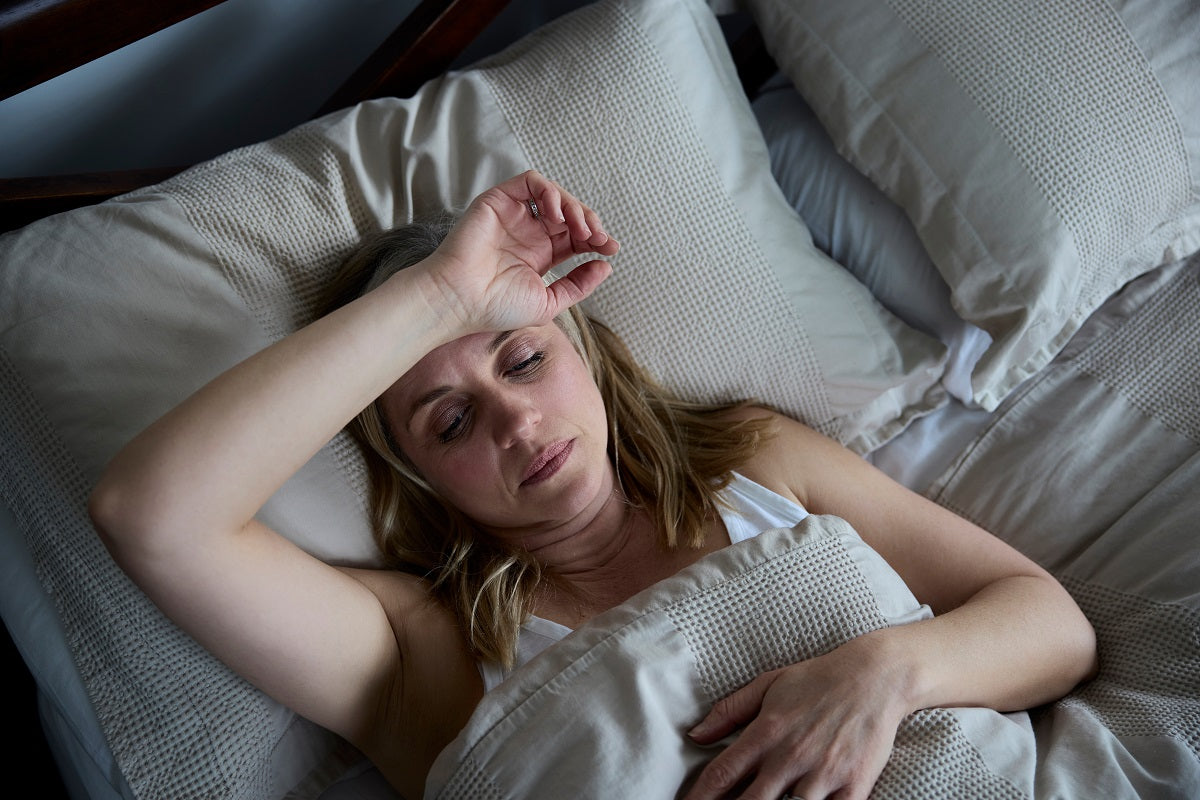Free U.S. Shipping On Orders Over $150

All The Ways Menopause Makes It Harder to Sleep Well
Posted on
One of the most common complaints among menopausal women is that they are unable to sleep. People who easily sleep for 8 hours each night suddenly only sleep 5-6 hours at best.
Some of this is caused by discomfort from symptoms like hot flashes and night sweats. Some of it is inexplicable. You just lay there in bed with no sleep forthcoming.
The worst part is that lack of sleep can itself worsen your menopause symptoms. It becomes this vicious cycle that’s hard to break. Here are all the ways menopause messes up with your sleep plus tips on how to sleep well nonetheless.
4 Ways Menopause Affects Sleep
1. Hot Flashes Wake You Up In the Middle of the Night
One of the most annoying, and uncomfortable, symptoms of menopause is hot flashes. When they occur at night, they often disrupt sleep. A sharp spike in body heat, which can reach the level of pain for some women, wakes you up in the middle of the night. Once it passes, it’s hard to go back to sleep.
Hot flashes are often accompanied by night sweats that make you even more uncomfortable.
2. Unexplained Insomnia
Many women going through menopause describe experiencing insomnia for no particular reason. They are not overly stressed or anxious, they’ve not been woken up by hot flashes or experienced any other discomfort.
You go to bed but sleep doesn't come. Sometimes, you wake up at 3am in the morning, all sleep having escaped you.
One explanation for this is that menopause disrupts the circadian clock, which is essential in telling the body when to sleep. This can make you feel sleepy and tired during the day but leave you alert and awake at night.
Some researchers also think aging has something to do with insomnia during menopause and postmenopause. Your melatonin reduces with age. This reduction coincides with menopause, which explains some of the menopausal insomnia.
3. Your Mental Health Takes a Dive, and Your Sleep Follows
Menopause causes or worsens stress, anxiety, depression and other mental health issues. This is not just because women are having a midlife crisis. It’s usually because of hormones.
A drop in estrogen also leads to a drop in serotonin, which explains why mental health stutters during menopause.
With higher levels of stress and anxiety, your sleep quality doesn't stand a chance. There is a high risk of insomnia, which in turn further worsens your mental health.
4. Sleep Apnea is More Likely
Menopause also increases the risk of sleep disorders, specifically sleep apnea. Hormonal fluctuations, circadian rhythm disruptions and menopause-related weight gain can all increase the risk of sleep apnea. Hormonal changes can also cause snoring, even if you’ve never been a snorer.
Sleep apnea and snoring may not cause you to wake up in the middle of the night, but they can prevent good quality restorative sleep. You’ll sleep for eight hours, but still feel fatigued and sleepy during the day.
The Dangers of Sleep Deprivation During Menopause
Lack of sleep during menopause is more dangerous than some tiredness during the day or getting sleepy in the afternoon.
Your health is already compromised by hormonal fluctuations. Estrogen plays many protective roles in your body. When it drops, you have a higher risk of heart diseases, hypertension, diabetes, osteoporosis and more.
Sleep deprivation is notably damaging to your health. It has been linked to numerous health problems like cancer, diabetes, heart attack, obesity, alzheimer’s, depression and so on. So adding sleep deprivation on top of menopause is a recipe for poor health.
That’s why it matters that you try and get enough sleep during menopause, as hard as it might be. If you don't, it only makes menopause more uncomfortable and puts your health at risk.
How to Sleep Well During Menopause
So how the heck do you sleep through the night when hot flashes keep waking you up and insomnia strikes whenever it wishes. Here are some helpful tips.
- You may not feel like it, but it’s super important that you keep up with exercise. Not only does it help with bone strength and heart health, it will also help you sleep better at night. It improves how the circadian rhythm works, increases melatonin levels and fights insomnia.
- This is not the time for late night binging. Stick to a regular bedtime routine, even on weekends.
- Find ways to manage your mental health. Stress and anxiety are bad for sleep. Try things like yoga, exercise, outdoor activities like hiking, and social activities.
- Keep your bed comfortable. Cool and breathable bedding can help you sleep better and reduce disruptions from hot flashes.
- Try natural supplements like magnesium and melatonin. They can help fight off insomnia.
Quick links
Contact
6063 Hudson Road #160
Woodbury, MN 55125
Yo@hercLeon.com
Leave a comment: